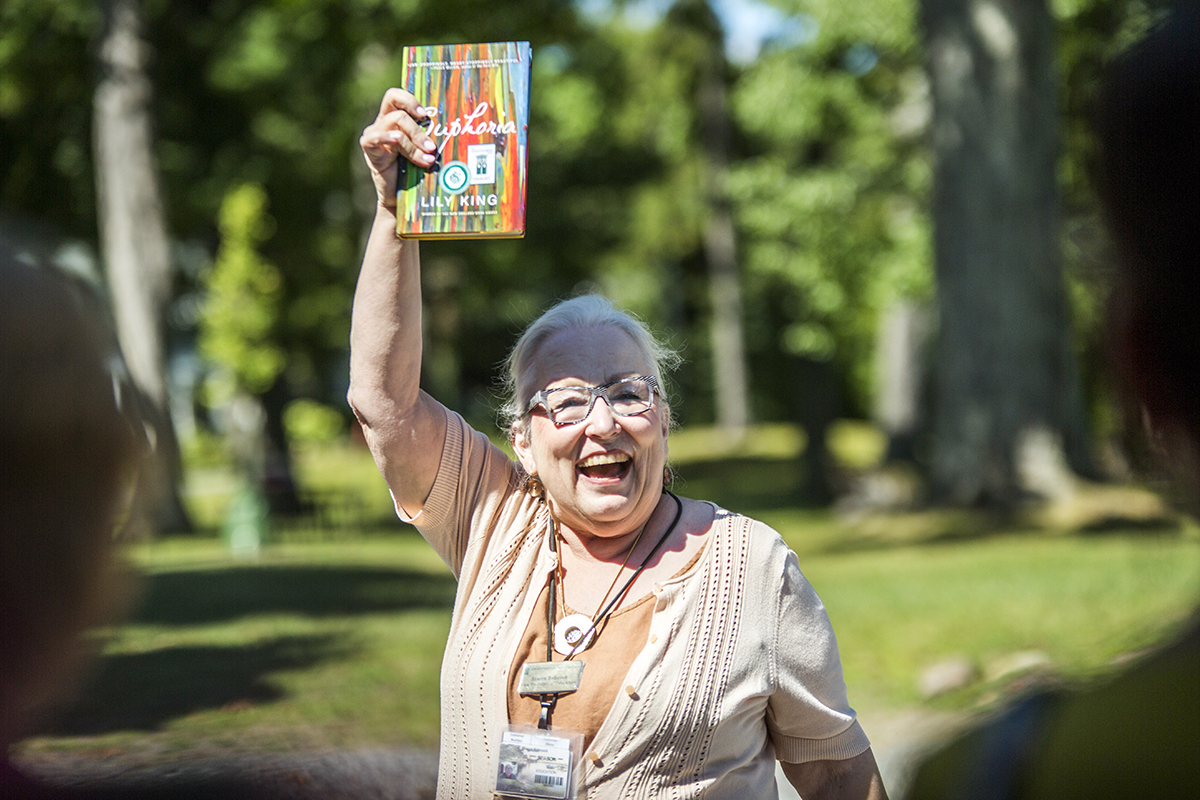For the literary-minded at Chautauqua, the new year begins on Bryant Day.
“Bryant Day needs to be explained to new Chautauquans,” Chautauqua Literary and Scientific Circle Director Nately Ronsheim said in 1975. What followed, according to The Chautauquan Daily, was a skit that dramatized the correspondence between William Cullen Bryant and John Heyl Vincent and illuminated the history of the event.
Named in honor of Bryant, a poet and journalist, Bryant Day is meant to celebrate the start of a new reading year for the CLSC. The event will be celebrated at 11:30 a.m. Saturday at the Miller Bell Tower.
Bryant, an ardent supporter of the CLSC, wrote to Vincent in 1878 to tell him that he wouldn’t be able to attend the inaugural Bryant Day festivities in November. But, he wrote, he was “interested to watch, during the little space of life that may yet remain to me, the progress and results of the plan which has drawn from me this letter.”
That estimate of a “little space of life” was accurate: Bryant didn’t live to see the outcome. He died in June of 1878, but nevertheless, the Bryant Day festivities — and the CLSC — carried on.

It is a tradition that has evolved over time. Past iterations have involved picnic lunches (a 1977 story in The Chautauquan Daily urged attendees to “come at noon and bring your own sandwiches”), special speakers and choirs.
Many of the amendments to the ceremony have been made in the name of accessibility. Once observed in the fall, Bryant Day was moved in the 1930s to a Saturday at the end of the summer so more Chautauquans would be able to participate and revel together in their love of reading.
Over time, the ceremony has gotten shorter, too. Reporter George Cooper wrote in the Daily in 2007 that “the ceremony is short and sweet, but its brevity is not indicative of its depth in the tradition” of the CLSC.
Amid the changes over the decades, a few elements have remained the same: the ringing of the Bryant Bell — often noted in the Daily as the “heaviest and lowest-toned bell” in the bell tower — and the announcement of new CLSC books confirmed for the following year.
Those traditions have stayed alive under Sherra Babcock, vice president and Emily and Richard Smucker Chair for Education, who joined the Institution’s staff in 2007. The Bryant Day ceremony is part of Babcock’s job, sure, but one can see it’s also a joy for her — found in her distinctive hats, or the glee she brings to the big reveal.
Babcock playfully opened the Bryant Day festivities in 2014 by building up suspense and telling her audience that she had “some surprises.”
“Have I prolonged the anticipation enough?” she said.
It’s that joy and genuine pleasure in her work that have defined Babcock’s tenure at Chautauqua Institution. She’ll retire at the end of the season after 10 years in her role.
One outlook clear, one leader dear
Upon joining the Institution staff in 2007, Babcock explained her vision for Chautauqua’s future, and her role in it, in a story for the Daily.
“If a place, a thing or a person doesn’t get better, doesn’t learn more, then it’s not growing, and I hope to be part of that kind of growth,” Babcock said in 2007.
Former Chautauqua Institution President Tom Becker put her to work.
Reporter’s Notebook
The following poem was written by Grace Livingston Hill Lutz for the Bryant Day ceremony. According to volume 52 of The Chautauquan, it was first read on Bryant Day in 1907. It is a tradition that has continued ever since.
Temple and halls are silent now,
The forest aisles along,
The hush of Fall is over all,
The multitudes are gone.
But hark! Thru all the quiet paths,
A bell peals clear and true,
Its echoes sound the world around,
Across the waters blue.
Our Circle’s royal friendship
Sweeps on from height to height,
One outlook clear, one leader dear,
For wisdom, God and right.
Chautauqua bell, ring loud and long
The opening of the year,
The signal waits beside your gates,
Ring, that all earth may hear.
Dear hillside by the quiet shore,
In hearts your watch-fires burn,
With answering fire that shall inspire
Still other hearts in turn.
Fling wide your music, deep-toned bell,
From out your woodland tower!
Ring, clear, sweet bell, the story tell!
Proclaim the opening hour.
“When I hired her, one of the things I was dissatisfied with was the fragmented elements of our literary arts,” Becker said. “They were separate programs, they had little relationship to one another, they were like separate silos running off in different directions.”
Becker asked Babcock to figure out a way to unite those programs, and during her time at Chautauqua, Becker said, she’s done exactly that.
Throughout her tenure, Babcock has taken the many different elements of Chautauqua’s literary arts programming — including the CLSC, the Chautauqua literary journal, the Smith Memorial Library, the Alumni Association of the CLSC, the Young Readers program, the CLSC Veranda, the Chautauqua Writers’ Festival and the Chautauqua Writers’ Center, among others — and united them under one umbrella.
Matt Ewalt, associate director of education and youth services, said Babcock’s gathering and organization of the literary arts programming has primed it for even more expansion in the future.
“That’s possible almost entirely because of the work Sherra has done during her tenure to raise the literary arts as a true art form on these grounds — taking the longstanding traditions of this place, but also thinking about the role the literary arts played on the grounds and weaving together all of those different threads in a way that tells a far more compelling story,” Ewalt said. “That’s something that she can almost entirely lay claim to. That’s one of many achievements, one of many success stories that she leaves with in terms of positioning Chautauqua where we are right now.”
While bringing together those various parts of Chautauqua’s literary arts tradition, Babcock also introduced a new one: The Chautauqua Prize, which was established in 2011 and first awarded in 2012. The Prize is meant to honor a book that is both a good read and a contribution to literature, and the winning author receives $7,500, a weeklong residency on the grounds and a physical prize specifically designed to honor their book.
President Michael E. Hill said the establishment of the Prize is one of Babcock’s major accomplishments, along with the way she’s overseen the growth of literary arts programming as a whole.
“There are lots of things she’ll be known for, but as we’re writing Chautauqua’s history, I think she can hang her hat on being one of the most important figures in elevating the literary arts here,” Hill said.
The inaugural year for The Chautauqua Prize drew 65 entries from 36 publishers, with author Andrew Krivák winning for his novel The Sojourn. By 2017, the Prize drew nearly triple the number of entries, with 192 books submitted for consideration. Author Peter Ho Davies won for his novel The Fortunes.
Sara Toth, lecture and literary arts associate, said Babcock created the Prize “out of nothing” and has turned it into a further expression of Chautauqua’s literary pedigree.
Toth first met Babcock in her work as the literary arts reporter for the Daily in 2009. She joined the education staff in 2014, where she’s worked alongside Babcock on the literary arts programming, which includes the Prize and the CLSC.
“The CLSC has a really robust tradition and a really robust legacy,” Toth said. “Chautauqua is the CLSC, and the CLSC is Chautauqua — and Sherra took it to another level.”
Toth said she’s lost track of the number of books that she and Babcock have handed back and forth over the years, but what’s become clear in their work together is that Babcock wanted to bring books to Chautauqua Institution that are both good and important.
Babcock wanted their authors here, too. Toth said Babcock has emphasized getting the authors on the grounds so their work can be honored and they can interact with the audience.
Besides doing that good and important work, Toth said, it’s also just fun to talk to Babcock about books.
“There is a wonderful energy that she has,” Toth said. “She just so truly loves the work, and that is really infectious, and it’s really motivating. To work in the Department of Education, and with Sherra, means that every day is different, and it’s always something that’s deeply interesting and exciting.”
Becker said that energy and joy is something that he misses about Babcock since his retirement in 2016. He said Babcock’s delight in finding authors whose work can illuminate a subject “just lifts her to another level.”
“She’s not a drab critic who is analyzing the aesthetic metrics of performance or delivery of creative work, but a real lifelong learner,” Becker said. “When she’s deeply affected by something, she’s not at all afraid of leaping out of her chair with a sense of wonder. And that’s contagious. It’s a lovely reminder of what it is to be a Chautauquan.”
Its echoes sound the world around
Babcock’s role in the Department of Education also means she’s had a hand in sculpting the morning lecture platform — one of Chautauqua Institution’s key programs — over the past decade.
During her tenure, she’s helped foster new partnerships with National Geographic Society and Jazz at Lincoln Center, and fostered relationships with luminaries such as Time managing editor Nancy Gibbs, documentarian Ken Burns and authors Margaret Atwood, Billy Collins, Anthony Doerr, Jon Krakauer, David McCullough and Ann Patchett.
In planning the morning lecture platform, she’s worked with Becker, Ewalt and Toth, among others.
Ewalt joined the Institution staff with Babcock in 2007, and said working side-by-side with her over the past few years has been a tremendous honor. Ewalt said Babcock brings a sense of genuine engagement to the programming of the lecture platform, and she always considers different and unexpected perspectives.
“It’s a fierce curiosity, and a humility and desire to learn more,” Ewalt said. “I’ve always found her approach — from building a lecture platform to thinking about the role of the literary arts on these grounds — is based in both a desire to learn more about the world but also to learn from those working alongside her.”
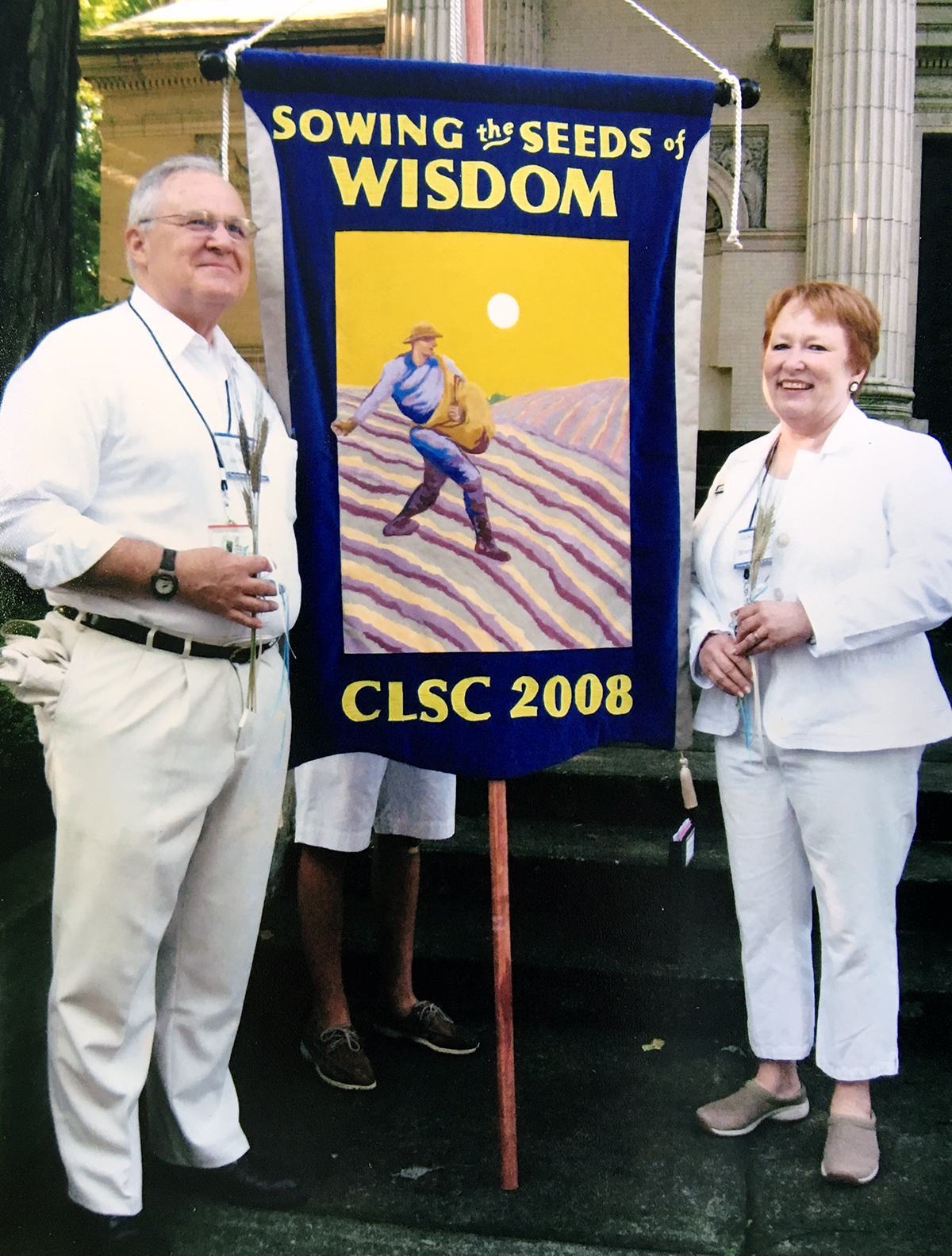
Toth said Babcock’s approach is a democratic one.
“Her approach is that a good idea is a good idea,” Toth said. “It doesn’t matter where it comes from.”
Jordan Steves, Institution director of communications, said Babcock has been an essential part of solidifying the planning process for lecture programming and ensuring it honors various points of view. Steves joined the Institution staff in 2009 and has spent almost eight years working with Babcock in various capacities, including planning the morning lecture platform.
“It’s a process in which input comes from all over the place — community members, staff members, up and down the hallways of the Colonnade, all around the grounds, from speakers — she’s done such a great job of building relationships with people that Chautauqua should know and people who should know Chautauqua,” Steves said.
The morning lecture platform is primed to really take off due to Babcock’s diligence, Steves said.
“It is Chautauqua’s signature program, and it should be something that all of the country knows about and tunes into when something happens on that stage,” Steves said. “We’re just about there, and I think a lot of that is because of her.”
Ring clear, sweet bell, the story tell
Hill said the common joke is that it will take three people to replace Babcock when she retires, but “it’s absolutely true.” In addition to her regular responsibilities, Babcock has been instrumental in making sure that things don’t fall apart once she leaves, Hill said.
“I’ve joked with her that she mothered so many things into being or success here, and I think she’s shown that same care in making sure none of those things drop just because she’s not here,” Hill said. “Which is what, ideally, you want for any leader — we should never set things up so that when we’re not here, they can’t work.”
Part of that process was splitting up Babcock’s wide-ranging job duties across different titles.
David Griffith and Atom Atkinson will officially join the staff in September, taking on two of those positions. Griffith will serve as vice president and Emily and Richard Smucker Chair for Education, and Atkinson will serve in the new position of director of literary arts. Ewalt will be promoted to chief of staff in the President’s Office and will lead lecture programming.
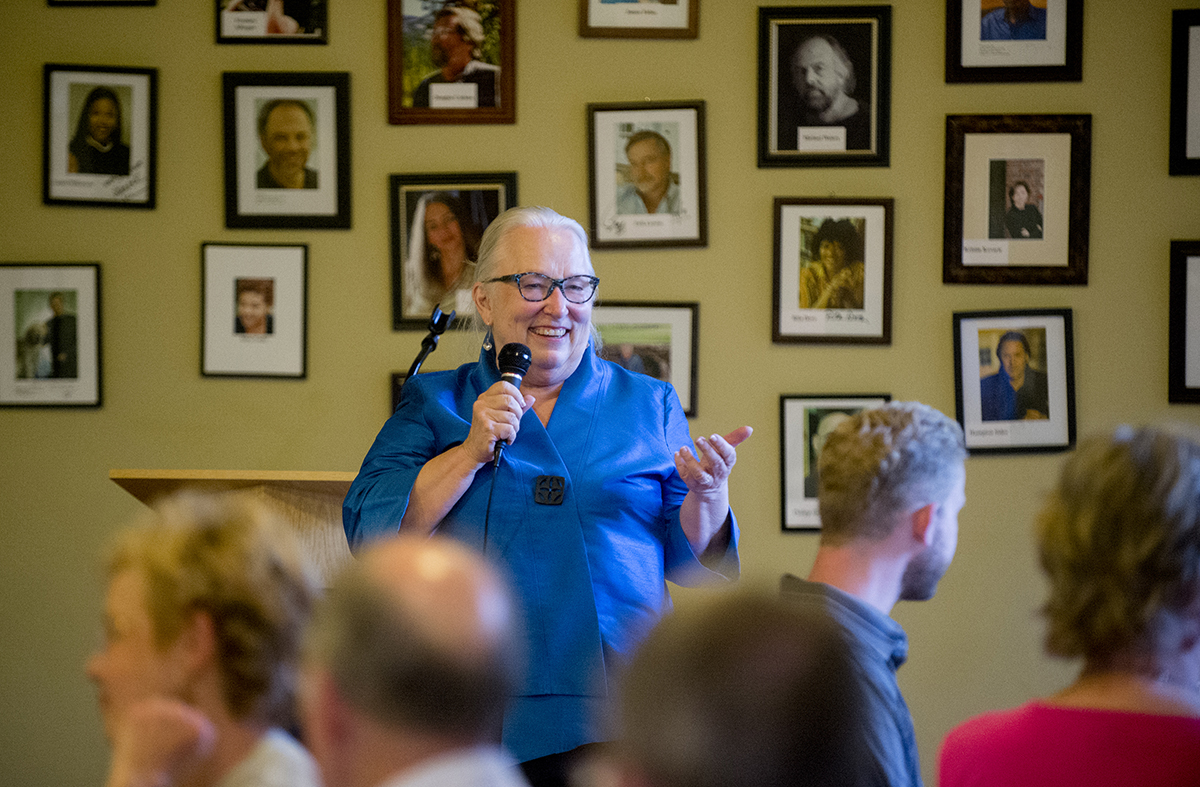
Hill said Babcock was instrumental in overseeing this line of succession and in figuring out how these new positions will work together.
“She has gone out of her way to make sure that that transition is completely seamless,” Hill said.
Part of that transition has been letting Griffith and Atkinson shadow her during her final season so both can see what their future positions entail. Griffith and Atkinson followed Babcock during Weeks Six through Eight.
“It’s been a really great learning experience,” Griffith said. “The days are built around us being able to ask Sherra questions, not Sherra telling us this is how you do this and that.”
Atkinson said that being on the grounds with Babcock and seeing her do her job has made it apparent that she’s someone “who believes in lifting everyone in her community up — and giving and making space for everyone in the community.”
Griffith agreed, and said observing Babcock has made clear how her past career experiences, such as her time as a dean of students at Southwestern University, have informed her work at Chautauqua Institution.
“Through those other experiences, she is able to see the way that the work Chautauqua does is of importance to the entire world,” Griffith said. “There are all kinds of different careers you could go into with the skills she has, but she found her way — thankfully — to Chautauqua.”
Atkinson said it’s apparent that Babcock leaves behind “a legacy of genuine generosity and kindness toward everyone she encounters, without ever losing hold of the seriousness with which she takes these programs.”
“That only emerges from finding them deeply meaningful in the first place, and finding those relationships you’ve developed really meaningful in the first place,” Atkinson said. “That’s a legacy I take very, very seriously.”
With answering fire that shall inspire
Babcock’s achievements during her tenure at Chautauqua Institution represent only part of what she brought to her work.
Her personality, her presence and her perspective are a part of that legacy, too, Becker said.
Babcock has a disposition that’s rooted in a “genuine well of kindness,” Becker said, as well as a firmness.
“It makes people step up,” Becker said. “When work isn’t done well, or the exchanges that are going on aren’t honest, she’s very direct about calling that what it is. But then again, that kindness is there underneath all of that, and it invites both change and improvement.”
He often misses her wit, Becker said, as well as her “modest approach to her own role that is deferential in some ways, but also shows she’s quite certain about who she is.”
“And when I think about what she brings to the game — there’s both an intellectual and emotional pride that resides there,” Becker said. “That speaks to the pleasure and the personal importance she places on doing really good work. It’s never something she ‘has’ to do, it’s something she’s built to do. It’s a sense of purpose.”
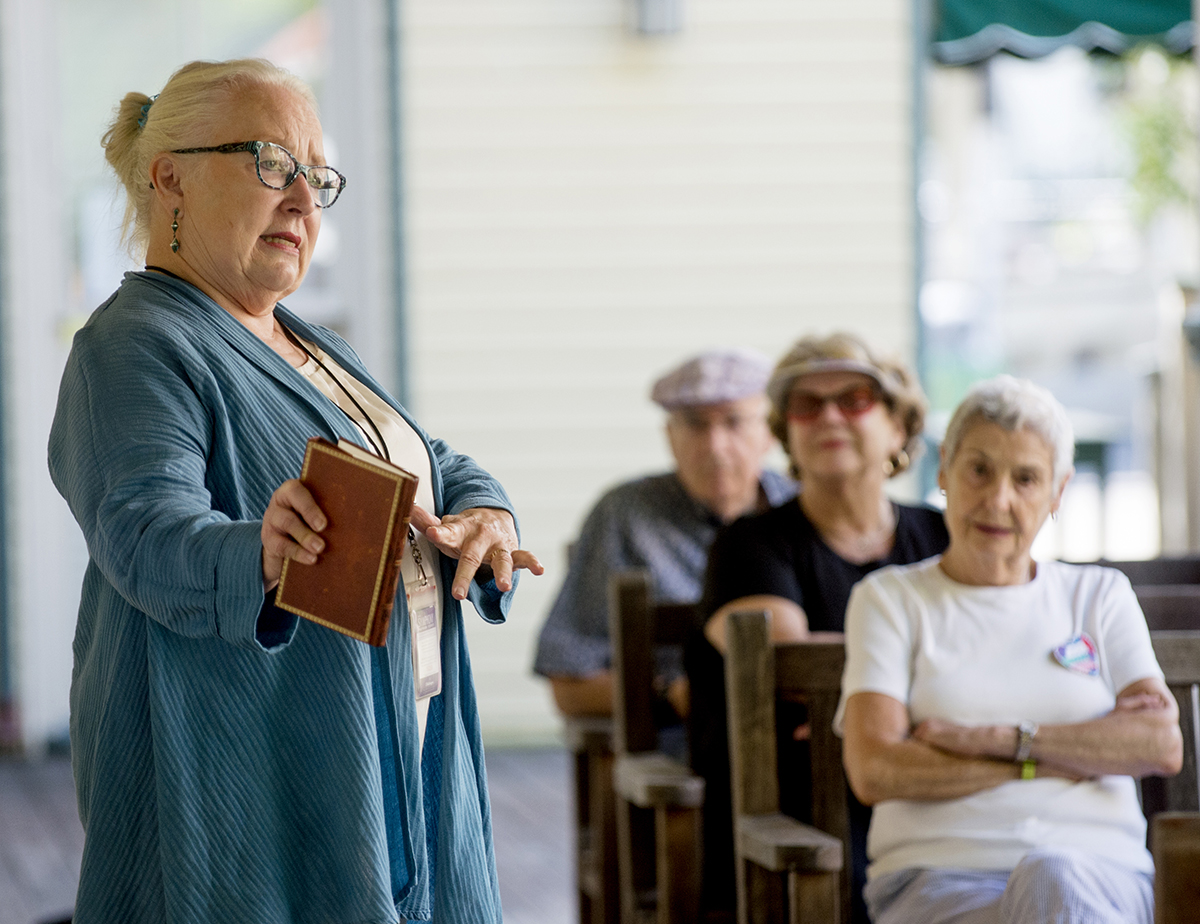
Toth said Babcock has taught her not to underestimate herself or others.
“She’s very intentional in the way that she lifts you up, and in her expectations of you — you want to rise to meet those expectations,” Toth said.
Both Steves and Ewalt said as they’ve worked with Babcock, they’ve been able to see how she embodies the idea of service leadership. Ewalt said she’s set an excellent example of how to be patient and gracious in dealing with others.
“Working as closely with Sherra for the past few years and intensely as we have, I’m going to miss serving alongside and working alongside someone I consider a great friend,” Ewalt said. “I’m learning every day from her in terms of leadership, in terms of getting the most from a team, in terms of engaging with the Chautauqua community in conversation and being informed by that community with grace and wisdom.”
And while he’s only had a year working alongside Babcock, Hill said it didn’t take long for him to feel sad to see her go.
“She’s unbelievably thoughtful, her grasp of so many topics is remarkable and her deep care for the place is just evident in everything she does,” Hill said. “I’ve just so enjoyed having her as a colleague and feel a great deal of sadness that the season comes to a close — that also means she’s wrapping up her tenure here, and I only got a year with her.”
All of those attributes make a true Chautauquan, Becker said.
“In reality, she’s a Chautauquan right down to her toes,” Becker said. “That intellectual curiosity, that spiritual openness and inclusiveness, that sense of value, that purpose and the overall awareness of the accountability of our lives and acting on what we know — she embodies what it is to be a Chautauquan.”
The bell peals clear and true
If Bryant could see how the CLSC has developed over the years, he would likely be blown away by the progress that’s been made, and particularly by the work Babcock has done.
When it comes to Chautauqua’s history, Babcock’s tenure is short: 10 years out of the Institution’s 143. But — as Cooper wrote of the Bryant Day festivities in 2007 — while those years have been short, their brevity says nothing about their depth.
“This last stretch at Chautauqua — you could argue that she’s been preparing for this for her entire life,” Becker said. “It really does draw on every bit of the experience she had both in a personal way — the values, the attributes and her character — but also the experience she gained from her rich history in other work. This drew on all of it. And she knew that, and took great joy in that.”
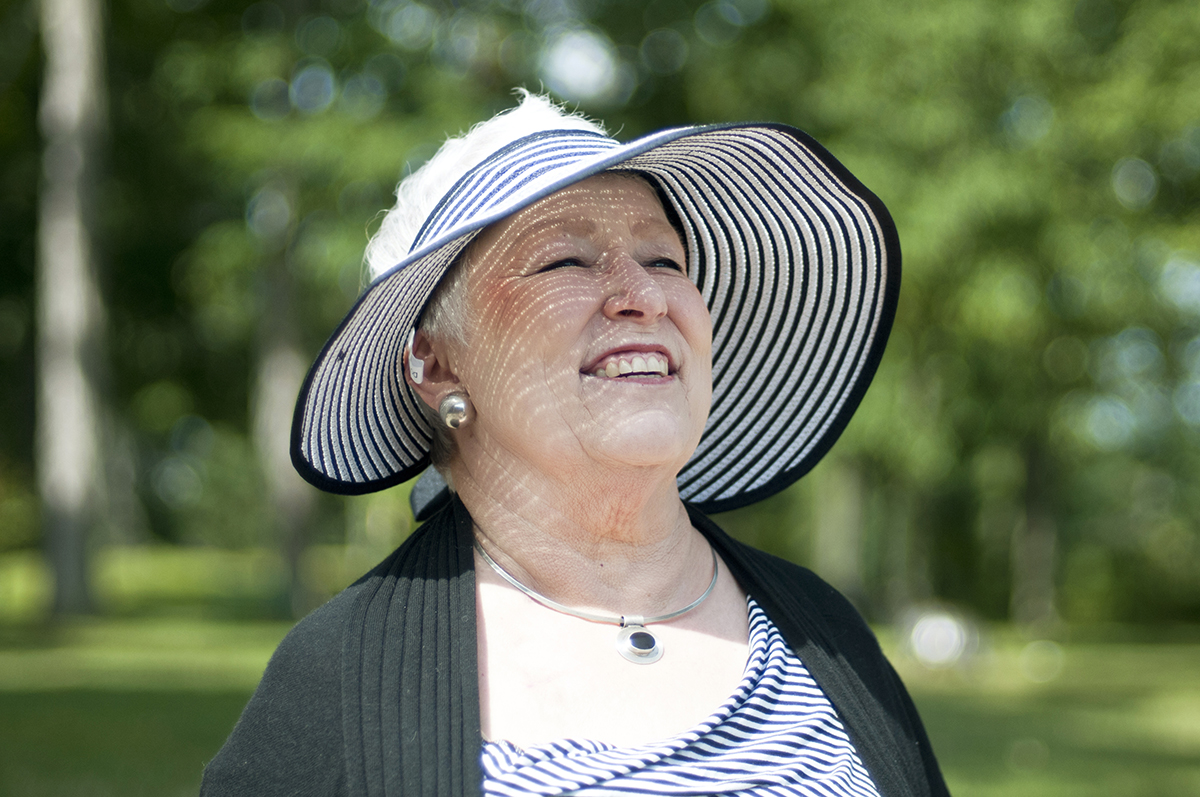
At Saturday’s Bryant Day ceremony, the 139th, Babcock will reveal just one CLSC selection for the 2018 season and make her final official mark on Chautauqua’s literary history.
Normally she reveals a few selections, but this year, her last, is a little different.
It was an intentional decision. Babcock said she wanted to leave space for her successors to leave their own signature on CLSC history.
It speaks to the way Babcock has seen her role over the years. Her legacy here is something that’s “both hers and not hers,” Ewalt said. Babcock has had an indelible impact on Chautauqua Institution, he said, but it’s the result of her intelligence, her humility and her collaborative nature.
In that initial interview with the Daily in 2007, Babcock expressed her excitement about Chautauqua’s future.
The sentiment still rings true, even as she prepares to leave Chautauqua Institution behind her and goes on to her next adventure.
“I know that we have to evolve and grow, and certainly Chautauqua has grown and evolved into what we see today,” Babcock said in 2007. “This is just the opportunity for that to continue.”
As Babcock oversees her last Bryant Day, the Bryant Bell — that heaviest and lowest-toned bell in the bell tower — will ring, too.
CLSC circulars from 1878 describing the ceremony say that when it comes to the ringing of the Bryant Bell, “Wherever they may be, true Chautauquans can hear its echoes.”
Surely the same can be said of Babcock. Chautauquans will hear the echoes of her work long after she leaves.


